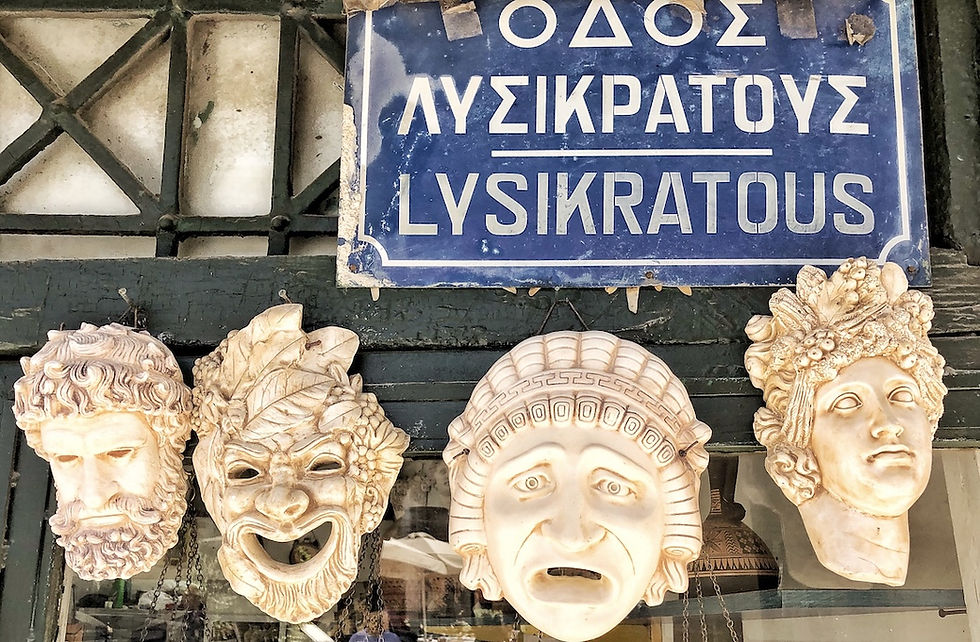Greek Last Names Explained: Meanings, Origins, and the Most Popular Surnames
- Sotiri Papanikolaou

- Sep 22
- 7 min read
Updated: Sep 23
Greek last names carry centuries of history, culture, and identity. They are more than simple identifiers. Each name tells a story about family roots, ancestral villages, personal traits, or connections to the ancient Greek world. For people curious about Greek culture, genealogy, or travel, exploring Greek last names is a journey into tradition, language, and heritage.

The patterns and meanings behind Greek surnames are fascinating. They reflect religion, geography, occupation, and even personal descriptions that have survived across generations. Whether you come across names like Papadopoulos, Antoniou, or Theodorakis, there is always a deeper origin worth exploring. This guide takes you through the history of Greek last names, the different types you will encounter, and the cultural significance they hold today.
Understanding Greek surnames can also help people connect to their ancestry. Many Greeks abroad discover their roots by tracing family names, often back to small villages in Greece. Others encounter these names when traveling and wonder about their origins. No matter where the curiosity begins, Greek last names offer an entry point into one of the world’s richest cultures.
Why Do Greek Last Names Have Such Unique Endings?
Greek last names are often recognizable because of their distinctive endings. These suffixes usually indicate the region of origin or sometimes a family’s social role.
-poulos: Common in the Peloponnese. It means “descendant of” or “little.”
-idis or -ides: Typical in northern Greece and areas influenced by Pontic Greeks. It means “son of.”
-akis: Common in Crete and the islands. Originally it was a diminutive form, often meaning “little.”
-atos: Found in the Ionian Islands, especially Kefalonia and Zakynthos.
-oglou: Of Asia Minor influence, meaning “son of” in Turkish.
These endings act almost like a map. When you hear a name, you can often guess the region the family once called home.
What Do the Most Common Greek Last Names Mean?
Certain Greek surnames appear frequently both in Greece and in Greek communities abroad. Their meanings usually connect to religion, professions, or traits.
Papadopoulos: One of the most common. It means “son of a priest.”
Georgiou: Derived from Georgios, meaning “farmer” or “earth worker.”
Nikolaidis: Meaning “son of Nikolaos,” linked to Saint Nicholas.
Christodoulou: Meaning “servant of Christ.”
Pappas: Refers to a priest.
Economou: Meaning “steward” or “manager.”
These names reveal how central religion, farming, and community roles have been in Greek society.
How Did Greek Last Names Develop Through History?
Greek surnames began forming in the Byzantine era. Before that, people often used only first names with descriptions. For example, “Giorgos the Fisherman” or “Maria from Athens.” Over time, these descriptions became permanent family names.
During the Ottoman period, surnames solidified and passed consistently through generations. Regional influences also left marks. For example, Asia Minor Greeks often adopted names ending in -oglou, influenced by Turkish naming patterns. In the Ionian Islands, Venetian influence shaped names with endings like -atos or -inos.
The evolution of surnames also reflects migration. As Greeks moved across the Mediterranean, they brought their names, often adapted by local languages. This explains why some Greek names have multiple spellings in different countries.
What Are the Different Types of Greek Last Names?
Greek surnames fall into categories that reflect how they were originally formed.
Last Names from Occupations
Many names describe what a person’s ancestor did for a living.
Psomas: Baker
Raptis: Tailor
Kalogeras: Monk
Psaras: Fisherman
These names show how family identity often tied to trades.
Last Names from Personal Traits
Other names highlight physical features or personality.
Xanthos: Blond
Kokkinos: Red or ruddy
Kontos: Short
Makris: Tall
Such names began as nicknames that stuck.
Last Names from Places
Geography also influenced surnames.
Athinaios: From Athens
Kritikos: From Crete
Makedonas: From Macedonia
Hydriotis: From Hydra
These names anchor families to specific regions.
Last Names from Religion
Religion remains central in Greek identity, and many surnames reflect this.
Papadopoulos: Son of a priest
Theologos: Theologian
Christakis: Little Christ
Panagopoulos: Descendant of Panagiotis, meaning “all-holy,” often linked to the Virgin Mary
Why Are Greek Last Names So Long?
One feature that fascinates people is the length of Greek last names. Some names stretch across many syllables. This is because they often combine a root word with suffixes that show relation, region, or profession. For example, Papadimitriopoulos breaks down into “priest of Dimitrios’ son.”
These names may feel complex to outsiders, but to Greeks they follow logical patterns. Long names often reveal rich stories about ancestry.
How Do Greek Surnames Change Abroad?
When Greeks migrated abroad, many surnames changed spelling or shortened. Immigration officers often altered names to make them easier to write in Latin script. For example:
Papadopoulos became Pappas.
Konstantinopoulos became Constantine.
Economou became Economy.
This adaptation helped Greeks fit into new societies while still carrying echoes of their origins. In Greek communities abroad, you will often see both the original and shortened versions.
What Are Some Rare Greek Last Names?
While some surnames are extremely common, others are rare and specific to certain villages or families. These names often survive only within small communities or among diaspora families.
Examples include:
Galifianakis: Known worldwide thanks to actor Zach Galifianakis, originally tied to Crete.
Samothrakis: From the island of Samothraki.
Argyropoulos: Meaning “son of silver.”
Voulgaris: Meaning “Bulgarian,” possibly marking someone’s origin or background.
Rare names add a sense of uniqueness to family identity.
What Are the Sub Keywords Connected to Greek Last Names?
When exploring the topic, certain related phrases often come up. These help people dive deeper into the subject.
Greek surname origins
Common Greek surnames
Greek family names history
Greek name suffixes
Rare Greek last names
Each of these connects naturally to the broader topic and guides readers toward a deeper understanding of Greek heritage.
How Do Greek Last Names Reflect Family Heritage?
Surnames act like a bridge between the past and present. For Greeks, the family name often connects them to a specific village, island, or region. Even today, many Greeks can trace their roots through their last names.
Family pride often ties to these names. They symbolize not just bloodline but also continuity of tradition. In villages, a last name can immediately tell locals who your family is and where you come from.
What Role Do Greek Last Names Play in the Diaspora?
For Greek communities abroad, surnames are vital for preserving identity. They serve as a link back to Greece even generations after migration. A Greek last name in places like the United States, Australia, or Canada often sparks recognition and connection among fellow Greeks.
Many people of Greek descent abroad take pride in explaining their names’ meanings. Others research their names to rediscover ancestral villages or family histories. In this way, surnames help keep the diaspora tied to Greece.
How Are Greek Last Names Used in Modern Greece?
In modern Greece, last names are used formally in legal and professional settings, but everyday conversations often rely on first names. Still, surnames remain important in family contexts. They carry respect for heritage and tradition.
Married women historically adopted their husband’s surname, though today many keep their maiden names. Children traditionally take their father’s surname, though modern practices sometimes blend or adapt this. These shifts show how Greek society balances tradition with modern values.
What Are the Most Recognizable Greek Last Names Worldwide?
Some Greek surnames have reached global recognition thanks to famous individuals.
Onassis: From shipping magnate Aristotle Onassis.
Galifianakis: Actor and comedian.
Tsitsipas: Tennis star Stefanos Tsitsipas.
Kyrgios: Tennis player with Greek heritage.
Kazantzakis: Author of “Zorba the Greek.”
These names carry Greek culture into the international spotlight.
How Do You Research the Meaning of a Greek Last Name?
People often want to discover the meaning of their family name. Several approaches can help:
Linguistic analysis: Breaking down the root and suffix.
Historical records: Church registries, village archives, and immigration documents.
Family oral history: Asking older relatives about stories linked to the name.
Tracing the origins often leads to discoveries not only about names but also about family journeys across generations.
What Makes Greek Last Names from Cyprus Unique?
Greek last names from Cyprus share many features with mainland Greek surnames, but they also carry distinct influences. Cyprus was shaped by centuries of Byzantine, Frankish, Venetian, and Ottoman rule, and this layered history appears in family names.
One noticeable feature is the frequent use of -ou endings, which act as a genitive form. For example:
Georgiou: Meaning “of George.”
Christou: Meaning “of Christos.”
Andreou: Meaning “of Andreas.”
This explains why you may have met an Andreas Andreou or a George Georgiou and felt confused. These surnames often repeat the given name in possessive form, which can look unusual to non-Greeks but makes perfect sense in Cypriot naming tradition.
Cyprus also produced surnames tied to geography and village life. For example:
Kyprianou: Literally “of Cyprus.”
Pafitis: From Paphos.
Larnakas: From Larnaca.
Religious surnames are widespread as well, reflecting the island’s Orthodox Christian roots. Names like Papachristodoulou (priest servant of Christ) and Panayiotou (of Panayiotis) remain popular.
Another feature of Cypriot last names is the persistence of older Greek forms. While mainland names often adopted suffixes like -poulos or -akis, many Cypriot names retained simpler possessive endings. This makes them appear shorter but just as rich in meaning.
Today, Greek Cypriot surnames act as strong cultural markers, both on the island and within diaspora communities around the world. They carry the island’s unique identity while still connecting to the broader Greek naming tradition.
What Are Some Fun Facts About Greek Last Names?
Many Greek surnames are longer than average European names.
The prefix Papa- almost always signals a priestly ancestor.
A name ending in -opoulos usually means the family came from the Peloponnese.
Certain surnames reflect historical events, like migration from Asia Minor.
Greek last names often preserve ancient Greek words no longer in common use.
These details show how deeply surnames are tied to language and history.
Conclusion: Why Greek Last Names Matter
Greek last names are not just labels. They are living pieces of culture that connect people to their ancestry, geography, and traditions. Whether tied to a village, a trade, or a religious figure, these names reflect the resilience and continuity of Greek heritage. For anyone exploring Greek culture, they offer insight into how families and history are woven together.
If you carry a Greek surname, you hold a piece of this story. If you simply admire the culture, learning about these names deepens appreciation for Greece and its people.
Follow us on Instagram @greece for more daily inspiration.
Visit GetGreece.com, your home for all things Greek and Greece.
This article was created by GetGreece.com (formerly Greece Media), founded by Tony Kariotis, one of the most recognized voices on Greek travel and culture. Followed by nearly one million people worldwide, with millions of monthly impressions and years of firsthand experience exploring Greece, we provide authentic information and practical guides that combine lived experience with expert insight. Our mission is to help travelers discover Greece beyond the postcards, with accurate, trustworthy, and inspiring content.









